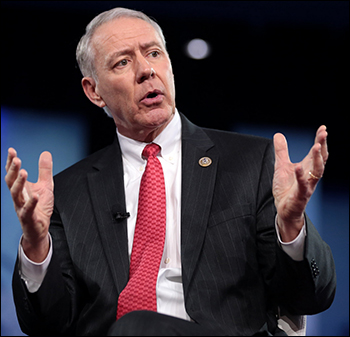By Jim Ellis — Wednesday, March 13, 2024
President
 Primary/Caucus Results — Primaries were held in three states last night, and even without results from the Hawaii caucuses, both President Joe Biden and former President Donald Trump exceeded the bound delegate vote requirement to score first ballot nominations. Therefore, both men become their party’s “presumptive nominee,” meaning they will become the official standard bearer at the respective party conventions in July (Republicans) and August (Democrats).
Primary/Caucus Results — Primaries were held in three states last night, and even without results from the Hawaii caucuses, both President Joe Biden and former President Donald Trump exceeded the bound delegate vote requirement to score first ballot nominations. Therefore, both men become their party’s “presumptive nominee,” meaning they will become the official standard bearer at the respective party conventions in July (Republicans) and August (Democrats).
The Georgia, Mississippi, and Washington primaries went as expected with both Biden and Trump winning with landslide totals against opponents who appear on the ballot but who have withdrawn from the race.
Mississippi was the state that held its full ballot primary last night. Sen. Roger Wicker (R) won renomination against two opponents with just over 60 percent of the vote. Wicker won all but 10 counties in the state from a total universe of 82. All four Magnolia State US House incumbents were either unopposed for renomination or easily won. Freshman Rep. Mike Ezell (R-Pascagoula) had two GOP opponents, and still surpassed 73 percent of the vote. All four: Reps. Trent Kelly (R-Saltillo/Tupelo), Bennie Thompson (D-Bolton), Michael Guest (R-Brandon/Jackson), and Mr. Ezell, now become prohibitive favorites to win again in November.
House

Rep. Ken Buck / Photo by Gage Skidmore
In Colorado, special election nominations are handled through vacancy committees that the local political parties construct. This means the voters will go to the polls only once to fill the balance of the current term.
This system likely plays to Rep. Lauren Boebert’s (R-Silt) detriment. It is highly unlikely that the District 4 vacancy committee members will choose her as the party nominee considering she is still the District 3 incumbent. This also means the dozen announced candidates already vying to replace Rep. Buck will see one of their colleagues likely chosen for the special.
California: More Finalists Projected — As the California ballot counting process moves laboriously along, the Associated Press is projecting that three more candidates will qualify for the general election from the top-two jungle primary. In the Los Angeles-anchored 34th District, both incumbent Rep. Jimmy Gomez (D) and movie executive David Kim (D) will again advance into the general election. This will be the third consecutive election in which the two have faced each other in a double-Democratic contest. In 2022, Rep. Gomez registered only a 51-49 percent general election win over Kim, so another close race is expected later this year.
In the open South San Francisco Bay seat from which veteran Rep. Anna Eshoo (D- Atherton) is retiring, former San Jose Mayor Sam Liccardo (D) is assured of advancing to the November election, but his eventual opponent has still not been decided. In second place is San Mateo Supervisor and former state Sen. Joe Simitian (D), who is only 749 votes ahead of Assemblyman Evan Low (D-Campbell) with approximately 26,000 ballots remaining to be counted.
Whoever wins the special will have a major advantage in the subsequent November regular election if the primary electorate chooses someone in the regular primary other than whom the vacancy committee decided upon. Another option the committee may have is to select someone who agrees not to seek a full term. Therefore, we will see more political drama occurring in Colorado as the campaign to replace Rep. Buck continues to unfold.
Governor
North Carolina: Two More Close Polls — Now that Lt. Gov. Mark Robinson (R) and Attorney General Josh Stein (D) are the official gubernatorial nominees of their respective political parties after last Tuesday’s primary vote, Survey USA and the Cygnal firm went into the field to test the general election between the two new official nominees.
The S-USA poll, conducted for WRAL-TV in Raleigh (March 6-9; 850 NC adults; 736 registered North Carolina voters; 598 likely North Carolina general election voters; online), sees AG Stein leading Lt. Gov. Robinson by a tight 44-42 percent margin, which is in the consistent realm of previously released surveys. When asked about presidential preference, the sampling universe would favor former President Trump over President Biden by a 50-45 percent margin in this most critical of swing states.
The Cygnal survey was conducted during the March 6-7 period (600 likely North Carolina voters; live interview & text) and produced a slightly different outcome. While projecting a similarly close result as Survey USA, Cygnal sees Lt. Gov. Robinson leading the gubernatorial race with a 44-39 percent spread. The latter firm also finds former President Trump holding a five point lead over President Biden but with a slightly different 45-40 percent count.






